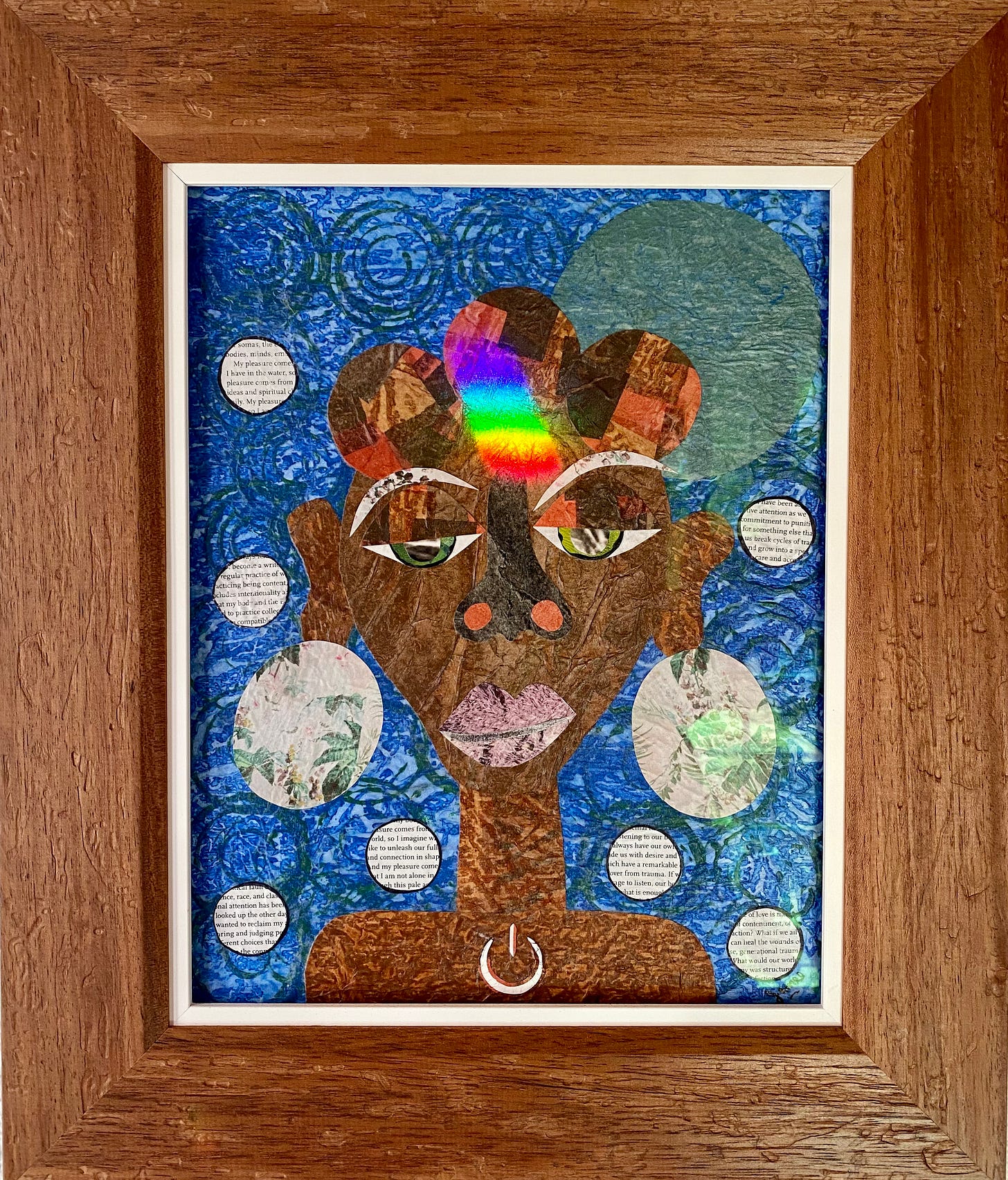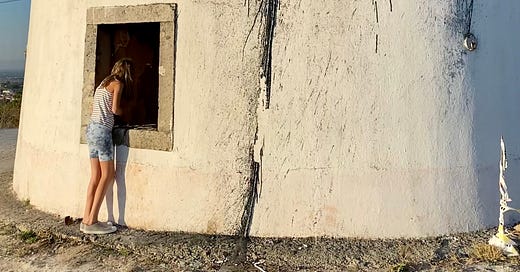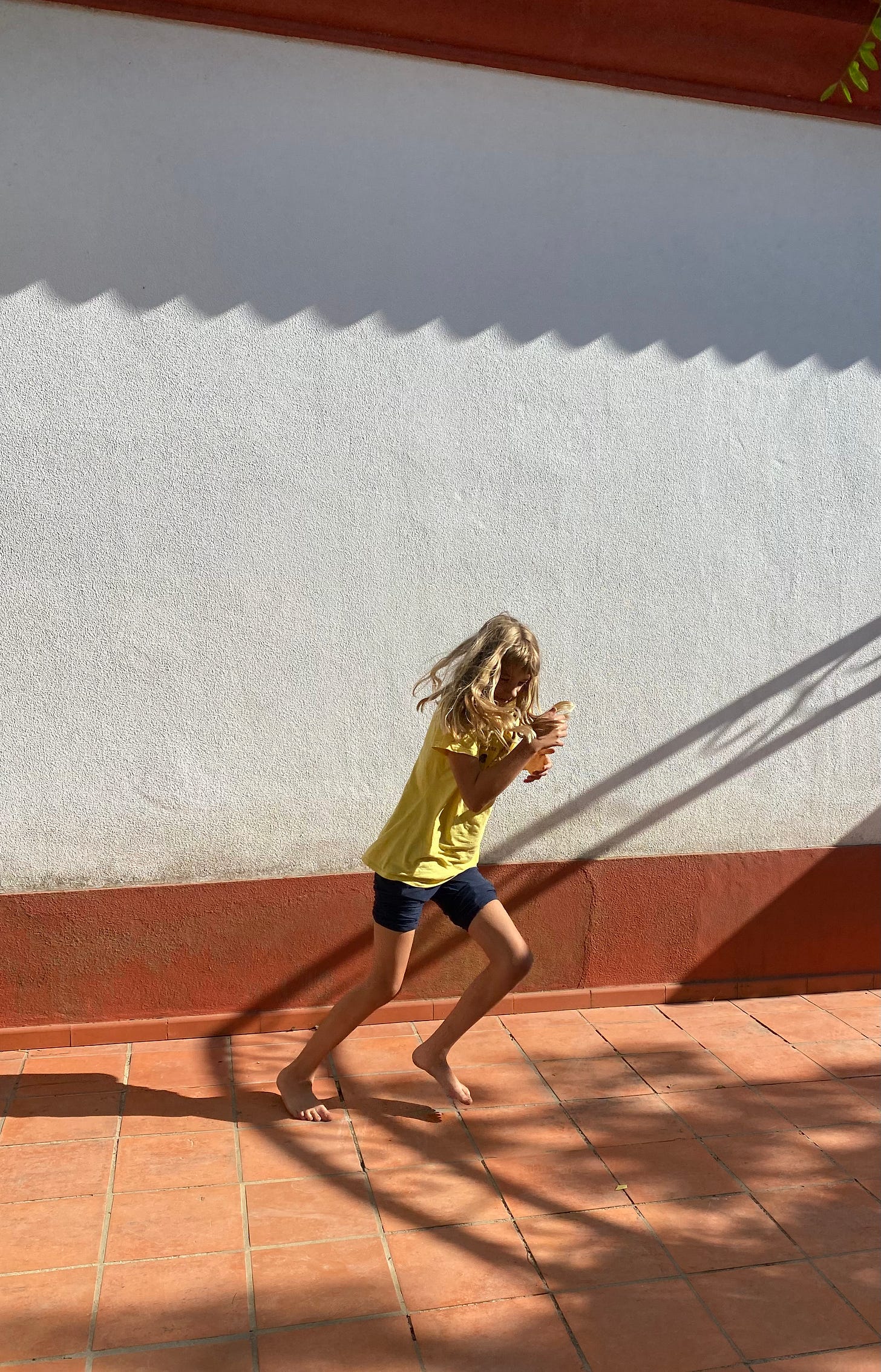
Growing up in a fundamentalist religious sect, I was taught there was only one truth: the one, only, and absolute word. The borders of that truth were infallible and unshakeable.
As I grew, I pushed back against those black and white borders. I sought out every shadow of grey. I searched every prism of light for the slightest shimmer of color. And as my world expanded, so did my definition of truth.
I learned that truth could sometimes be absolute. We are all born. We all die. But within those impenetrable bookends of life we experience a multiverse of truths. Not all of them are the same, because truth can depend upon our individual experiences.
I once wrote a poem about mowing the lawn while wearing a swimsuit* and my father’s reaction to my teenage “immodesty.” My sister read the poem and said she didn’t remember anything like that; my father had never spoken to her that way.
She was right. She didn’t mow the lawn in her swimsuit. My father didn’t freak out at her. That was her story. It was true.
But I was also right. My story was also true. These two truths exist simultaneously.
The human experience is vast. Our truths are legion. And these truths can easily be sliced and diced and served up in small slivers that tell only one piece of one story.
So it is with stereotypes. We casually toss out a phrase and call it day without considering whether it has any merit:
Blondes have more fun—or maybe they’re dumb. Women can’t drive. And they aren’t funny, either. Fat people are lazy. Skinny people need to eat a hamburger. Gay men are effeminate. Lesbians cohabitate on the second date. Japanese people are unfailingly polite. Americans are unfailingly loud. (Ok, that last one might have a bit more merit?)
The thing about stereotypes is that—although some are utter bullshit—others can contain a measure of truth. But when stereotypes get thoughtlessly flung about and sewn into the fabric of a society, they can do a great deal of damage.
Stereotypes condense diverse narratives into a single story. They cram a universe of complexity into a bite-sized nugget you can wield as a joke. Or a hammer.
In moving to Portugal, I’ve experience a whole new raft of stereotypes. One that gets served up on the regular in Facebook expat groups is: “Portuguese people are so warm and welcoming!!”
On the surface, this seems like a compliment. What a nice thing to say! But how we do like to oversimplify things. To define those black-and-white borders in neat little boxes and gloss over cultural differences that might be trickier to understand.
Have I expressed this sentiment myself? I have. Have I experienced the Portuguese people, en masse, to be warm and welcoming? I have.
But here and there, people who are Portuguese have also been rude to me and lied to me and yelled at me and made fun of me. Because they’re human. And they have bad days, and frustrating experiences, and they’re insecure or afraid or angry or exhausted. Same as me.
Shrinking 10 million people to a single monolith just makes them easier to codify. To commodify. We talk about the “friendly, welcoming nature of the Portuguese” just as easily as we talk about how the French are rude and Aussies are laid-back and Germans are industrious and Brits are reserved and Italians are passionate and on and on, descending into some truly dangerous binary narratives about entire cultures of people. You’ve heard them. You know.
Stereotypes at their best are cliché. At their worst, they are hurtful misrepresentations that spawn poison and prejudice.
But it’s a different oft-repeated stereotype that brought me to the keyboard today. The one about children and how they’re So Resilient! So Adaptable! Kids learn new languages So Quickly!
“Don’t worry,” countless people have told me (especially the people who don’t have kids), “your daughter will totally adjust!” They smile and shrug and give me a metaphorical head pat as they trill: Kids Are So Resilient!
This one has really sunk its claws in deep. I’ve come to loathe it to the point that whenever I encounter it, I experience a full body ugh.
Why such a strong reaction, you might be wondering. Isn’t it a nice thing to say? Isn’t it true? Isn’t it good for kids to be resilient, to be able to adapt?
Well, let’s break that stereotype apart, shall we? Let’s see what truths are packed inside this easily digestible soundbite:
Whenever you have a statement that lumps an entire group of people together, it’s problematic. Children, just like blonde people or skinny people or Portuguese people, are not a monolith.
They do not all behave the same. They don’t feel the same. They don’t experience the world in the same ways. Like every single human everywhere, children are varied and multifaceted. They deserve to be seen as such.Resiliency assumes hardship. Hardship assumes pain. Loss. Struggle. Grief. Trauma, even. As Brittany Meng, a fellow mother who also hates the “Kids are resilient” gloss put it:
“Kids don’t always recover from the wounds life hurls at them… Kids are resilient, they say. But we have to stop slapping this panacea on our kids’ pain, hoping that one day they figure out how to make lemonade out of the lemons life hurled at them.”
Hardship can teach us valuable life lessons, but those lessons come at a cost. Is my daughter glad that she lives in Portugal? Yes. Does she grieve the friends and the school and the life she left behind? Yes, daily. The gladness and the pain exist simultaneously. Because she’s as complex as any of us.
To praise her resiliency without taking her suffering into account is to do her a disservice. Such an oversimplification minimizes her sorrow, anxiety, and stress; as well as the effort she puts in to working through those heavy feelings.
People are not automatically resilient. The ability to rebound from difficulty isn’t an innate feature of childhood like losing baby teeth or hitting puberty. If my child is resilient, it’s because she knows she has help when she hurts. She knows she has support. She has people who will listen and bear witness to her truth; to life as she experiences it.
From a very young age, she’s learned that adversity isn’t the last word. That falling down is natural, but so is getting back up. If she’s resilient—if any child is resilient—they have earned that ability.Adaptability is also a learned skill. Adults who like to think that kids-as-a-monolith are adaptable have never met an overstimulated two-year-old who’s late for nap time.
I cannot begin to count the number of people—friends and strangers alike—who have attempted to reassure me by saying my daughter will magically thrive in any sort of school situation because, “You know, kids are so adaptable!”
The ability to adjust to new conditions is a variable equation. Is your child an introvert or an extrovert? Do they speak the language? Do they speak any languages other than their mother tongue? Do they know anyone else at the school? Do they make friends easily in general? How old are they? Is the school public or private? Is the class size large or small? Are other immigrant children in the class? Do the other students speak English? Do the teachers speak English? Is there an established program for Português Língua Não Materna? How long is the school day? How much homework is given? Are the teachers young/old/traditional/progressive? Do they have a basic understanding of modern child psychology? Does the school have art class?There is no single answer that will assuage a parent’s fears about their child’s adaptability in a new situation/new school/new language/new friends/new culture/new country.
Every kid is different. Every situation is unique. Some kids breeze through the transition. They make friends on the first day of school and within weeks are correcting their parents’ halting Portuguese. Others struggle every step of the way.
Each child’s experience is valid. Each experience is true. And the way we see these children’s experiences—the way we see children—matters.
They need our support. And they deserve our respect.
If this post has been a journey, it’s because this experience has been a journey for Filha and Marido and I. Chalk it all up to a personal pet peeve about a hackneyed phrase if you must.
But to me, words matter a great deal. And the way we talk about each other matters a great deal. Much like birth and death, this particular truth is universal—it applies to all of us.
*Bonus lawn-mowing poem:
Stumbling Block
At the 4-H Fair in Amboy
my mother told me
my shorts were too short.
They had never been
too short
before, but
she saw a man
watching me
as I heedlessly
circled the rides
on the midway.
Tan colt legs, knees
bound in band-aids,
blue cotton candy
stuck to my cheek.
On my way to the goat barn
she stopped me and said
Did you see that man?
She seemed angry
and a worm of unease
uncurled in my belly.
That was the first time
I understood the male gaze
came with teeth.
Four Julys later
I mowed the lawn
in a rainbow swimsuit
with leopard spots.
When my father got home
he seemed angry.
I cut the motor
and watched his arms
windmill
then went inside
and put on pants.
When leggings came in fashion
I learned to layer them
beneath baggy jeans
wriggling free of denim
only after parking my Chevette
far from home.
You don’t know my father said
what goes through a man’s mind
when he sees you
wear things like that.
It was my responsibility
to remain invisible
to let that gaze slide
safely by. When
all I really wanted
was to be stylish
fix my tan lines
eat cotton candy.
(by LaDonna Witmer)
Copyright © 2022 LaDonna Witmer







This needed to be said and you did so beautifully. How is resilience measured? That one endured hardship? One might forge through childhood traumas in a way that gives an impression of resiliency. More often than not they follow us like a shadow through our lives.
PS If you have a lawn, I hope you continue to mow in your swimsuit. :)
Yes, the platitudes are so aggravating. My kids have had a really hard time adjusting to our move overseas (and I have to fight back mom guilt almost daily, since we left a very full life in the US). We tend to be deep thinkers about everything, which is likely the main impediment to an easy and quick assimilation. Here's hoping it continues to get better for all of us... :)